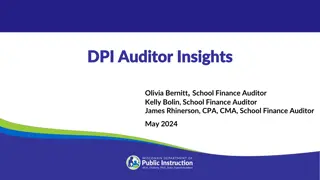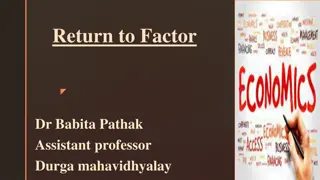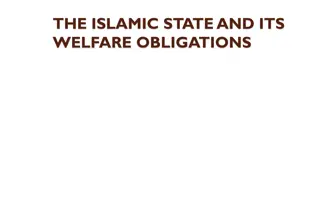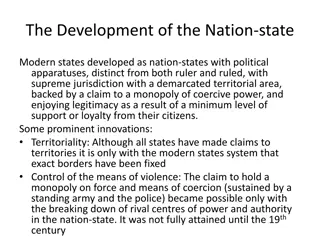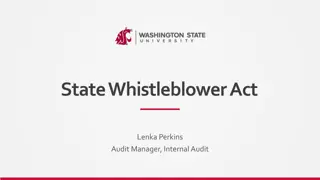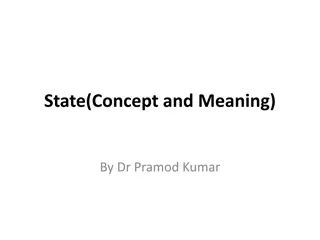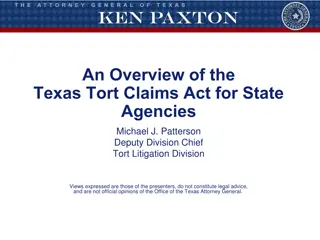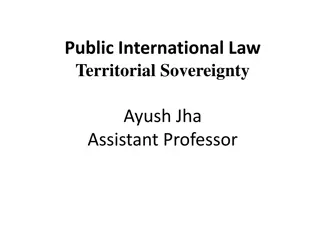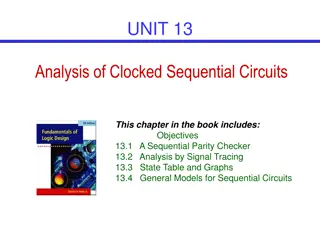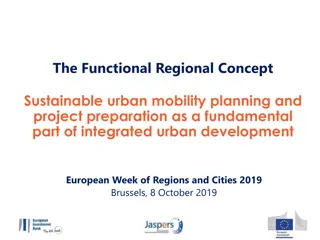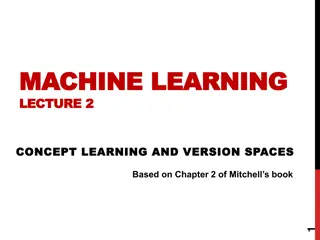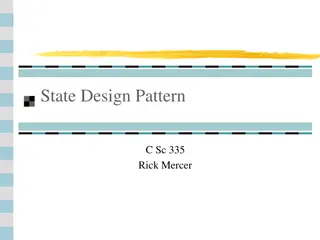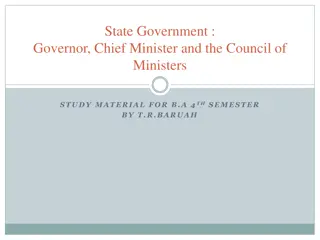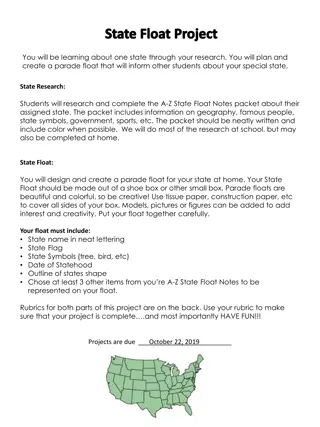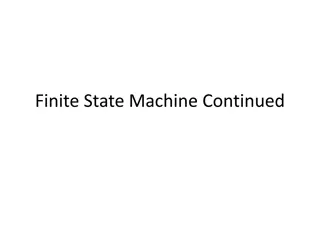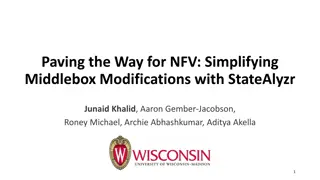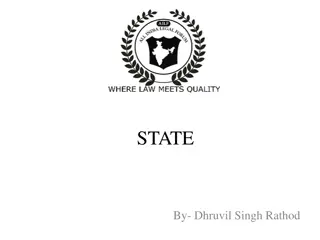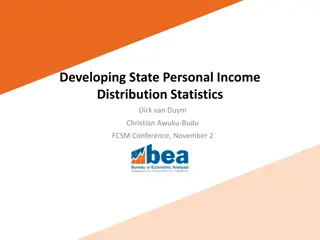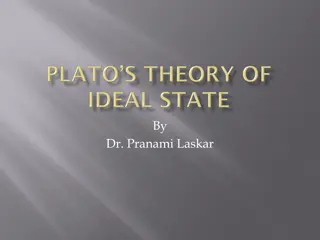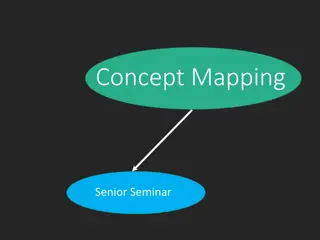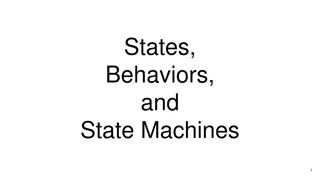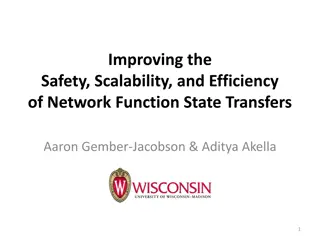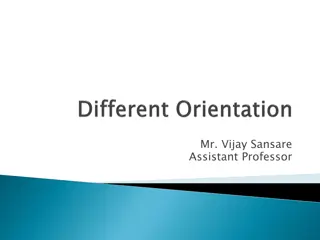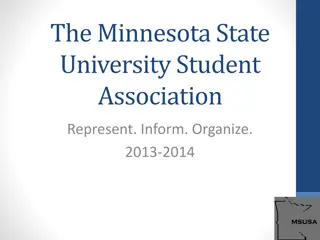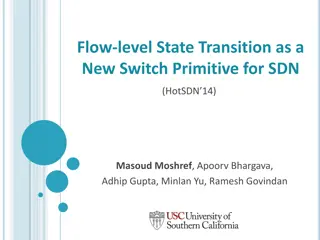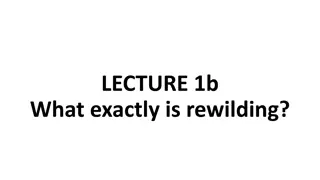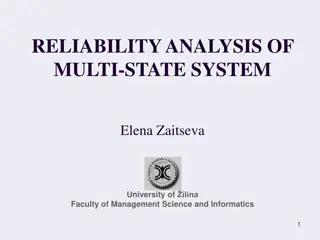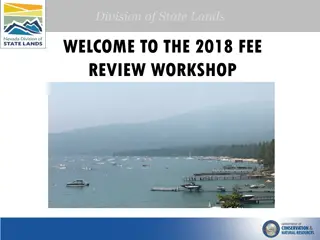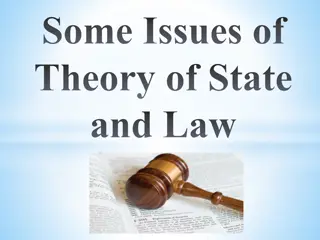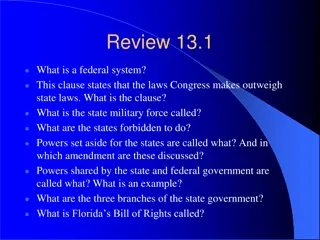Possible Analog States of the Hoyle State in Heavier Nuclei
Research conducted at the National Research Centre, Kurchatov Institute, explores possible analogs of the Hoyle state in heavier 4N nuclei, focusing on the 7.65 MeV 0+2 state in 12C (Hoyle state). The study reveals insights into the structure and characteristics of the Hoyle state, crucial for under
0 views • 12 slides
DPI Auditor Insights and State Audit Guidelines Overview
This collection of images and descriptions provides insights into DPI Auditor activities, state audit guidelines, and updates related to state major program determinations. The State Single Audit Guidelines for Wisconsin School Districts are highlighted, along with the State Audit Manual overview an
3 views • 36 slides
Understanding the Concept of Return to Factor in Production Economics
Return to Factor is a key concept in production economics that explains the relationship between variable inputs like labor and total production output. The concept is based on the three stages of production - increasing returns, diminishing returns, and negative returns. By analyzing the behavior o
0 views • 7 slides
Employee Rights in Colorado State Classified System
The State Personnel System in Colorado provides certain rights and protections for employees in state classified positions, including appeal and grievance rights. Classified employees must adhere to employment laws and are safeguarded against discrimination, retaliation, and harassment. Various fede
0 views • 72 slides
The Historical Significance of the First Islamic State in Medina
The Islamic State in Medina established by Prophet Muhammad marked the beginning of a new era in Islamic history. It was the first welfare state, where divine teachings were implemented under his guidance. This state pioneered the integration of spiritual and temporal authorities, setting the founda
0 views • 60 slides
Evolution of the Nation-State and Modern State Concepts
The development of the nation-state marks a significant shift in political organization, characterized by centralized power, territoriality, and legitimacy gained through citizen support. Key innovations include territorial demarcation, monopolization of coercion, impersonal power structures, and th
0 views • 8 slides
Overview of State Whistleblower Act in Washington State
The State Whistleblower Act in Washington State, governed by the Revised Code of Washington (RCW) 42.40, provides a mechanism for state employees to report improper governmental actions. The Act aims to encourage whistleblowers to come forward, prohibits retaliation, and authorizes remedies for viol
0 views • 28 slides
Understanding the Concept of the State by Dr. Pramod Kumar
The concept of the State is central to traditional political theory, with varying significance in modern political thought. It encompasses the idea of a community with legitimate authority over a territory. Various definitions by scholars like Sidgwick, Garner, and Laski highlight the key elements o
0 views • 17 slides
State Pension Plan Provisions Changes Effective July 1, 2022
The 2017 collective bargaining agreement between the State and the State Employees Bargaining Coalition introduced changes to retirement terms for state employees, affecting members of the State Employees Retirement System (SERS) and the Alternate Retirement Plan (ARP). Changes include adjustments t
5 views • 15 slides
Understanding Structural Realism in Global Politics
Structural realism in global politics focuses on the concept that states pursue power as a means of survival in an anarchic international system. Key differences between classical and structural realists lie in the perception of power as an end versus a means to an end. This perspective is based on
5 views • 26 slides
Understanding the Texas Tort Claims Act for State Agencies
The Texas Tort Claims Act (TTCA) outlines the scope of tort liability for State entities and employees during their state employment. State entities are represented by the Office of the Attorney General, and specific provisions apply to state entities separate from municipalities. This overview cove
0 views • 16 slides
Understanding Territorial Sovereignty in Public International Law
Territorial sovereignty is a fundamental concept in Public International Law, essential for understanding the exercise of state authority within a defined territory. This concept encompasses the legal aspects of sovereignty, jurisdiction, and the rules governing territorial ownership changes. The ac
1 views • 12 slides
Analysis of Clocked Sequential Circuits and Parity Checkers
This chapter delves into the analysis of clocked sequential circuits, focusing on topics such as sequential parity checkers, signal tracing, state tables and graphs, and models for sequential circuits. It covers concepts like Mealy and Moore machines, state equations, state graphs, timing charts, an
0 views • 38 slides
Functional Regional Concept for Sustainable Urban Mobility Planning
The Functional Regional Concept emphasizes sustainable urban mobility planning as an integral part of integrated urban development. This concept aims to support economic and social growth by adjusting the transport system to various activities within a city. It focuses on sector/system sustainabilit
0 views • 20 slides
State Re-structuring and Federalism in Nepal by Resham Kandel
State restructuring in Nepal involves the redistribution of power across different tiers of government and the redesign of governance structures to achieve political, economic, social, and administrative transformation. The concept focuses on decentralization, inclusivity, and proportional represent
0 views • 26 slides
Understanding Concept Learning and Version Spaces in Machine Learning
In the field of machine learning, concept learning involves inferring general definitions of concepts from labeled examples. This process aims to approximate the best concept description from a set of possible hypotheses. The concept learning approach is illustrated through examples, such as predict
0 views • 18 slides
Understanding the State Design Pattern in Software Development
The State Design Pattern is a Behavioral pattern similar to Strategy, allowing objects to change behavior based on internal state changes. This pattern involves defining different states and their implementations to control object behavior dynamically. Real-life examples like managing mood states an
0 views • 14 slides
Understanding Thomas Hobbes' Leviathan: State of Nature, Natural Laws, and Commonwealth
Thomas Hobbes explores the state of nature, natural laws, and the formation of the commonwealth in his work Leviathan. He discusses the equality of men, causes of conflict in the state of nature, and the transition out of this chaotic state towards civil society under a monarchy. According to Hobbes
0 views • 15 slides
Role of Governor, Chief Minister, and Council of Ministers in State Government in India
The Governor, Chief Minister, and Council of Ministers play crucial roles in the state government of India. The Governor acts as the constitutional head of the state, exercising executive, legislative, financial, judicial, and discretionary powers. The Chief Minister leads the Council of Ministers r
0 views • 7 slides
State Float Project: Research and Create a Parade Float
Engage in a project to learn about a chosen state through research and the creation of a colorful parade float. Students will gather information on geography, famous people, state symbols, and more, neatly compiling it in a packet. Subsequently, they will design a float showcasing the state name, fl
0 views • 16 slides
Understanding Finite State Machines in Digital Logic Design
Finite state machines play a crucial role in digital logic systems, allowing for the implementation of sequential circuit designs. These machines consist of states and transition functions, determining system behavior based on inputs and current state. The output function generates outputs based on
0 views • 35 slides
Simplifying Middlebox Modifications with NFV State Management
Paving the Way for NFV explores how Network Function Virtualization (NFV) simplifies middlebox modifications through state analysis and management. The process involves creating or updating state in middleboxes for various connections, utilizing frameworks for transferring live state, and addressing
0 views • 22 slides
Understanding the State: Definitions, Origins, and Evolution
A state is a complex and powerful social institution, yet its exact definition remains debated. Various scholars, including Woodrow Wilson, Aristotle, and Garner, offer different perspectives on what constitutes a state. The concept of the state dates back to ancient civilizations, emerging from the
0 views • 18 slides
Developing State Personal Income Distribution Statistics
This project aims to create a distributional account for State Personal Income, allowing for the analysis of inequality by state and over time. Using various data sources such as BEA aggregates and IRS statistics, the distributional model provides insights into state-level income inequality. Census
0 views • 17 slides
Philosophy of Plato: The Ideal State and Its Principles
Plato's Republic presents the concept of the ideal state governed by a philosopher king, with distinct classes and systems of communism in property and family. The state emphasizes functional specialization, justice, and totalitarian control but faces criticisms for lacking individual freedom, retai
0 views • 5 slides
Travel Policy Changes at Pittsburg State University
Pittsburg State University is implementing new travel policy changes effective January 1, 2016, aligning with federal standards for per diem rates. The changes are a result of the State of Kansas adopting federal rates and will impact all travel occurring after the specified date. The policy update
0 views • 21 slides
Mastering Concept Mapping for Senior Seminar Success
Explore the power of concept mapping in senior seminars, understand what concept maps are, why they are valuable, and how to create and utilize them effectively for organizing ideas, brainstorming, and enhancing collaboration. Dive into practical tips and tools to create meaningful concept maps for
0 views • 13 slides
Understanding State Aid Regulations in the EU Post-Brexit
State aid regulations play a crucial role in ensuring fair competition within the EU. Post-Brexit, the UK is likely to still be bound by these rules. State aid is defined as any form of aid granted by a Member State that distorts competition, posing challenges for trade between Member States. The EC
0 views • 18 slides
Understanding States, Behaviors, and State Machines in Programming
In programming, states represent assignments of values to variables, and executions are sequences of states. State machines capture these executions, while behaviors are specific subsets of executions. This content delves into the concept of state machines, behaviors, and their significance in softw
0 views • 21 slides
Enhancing Network Function State Transfers
Explore methods to improve the safety, scalability, and efficiency of network function state transfers. Addressing issues related to NF deployments, state management frameworks, and transfer mechanisms. Discuss challenges like safety, efficiency, and scalability with solutions such as re-routing flo
0 views • 16 slides
Understanding India as a Welfare State: Role and Commitment
India, as a welfare state, prioritizes the well-being and development of its citizens. It plays a key role in providing social services, promoting equality, and ensuring economic and social well-being. The concept of a welfare state in India is deeply ingrained in its governance and constitutional p
0 views • 22 slides
Understanding Federalism in the US Constitution
Forest Gump showcases the conflict between state and federal powers, exemplified by Governor George Wallace's refusal to desegregate the University of Alabama. The scenario underscores the concept of federalism, which isn't explicitly stated in the Constitution but is evident in the division of powe
0 views • 18 slides
Minnesota State University Student Association: Empowering Students for a Better Future
Established in 1967, the Minnesota State University Student Association (MSUSA) represents over 70,000 state university students, aiming to bring students' voices to decision-makers. With a budget of $760,000, MSUSA plays a crucial role in advocating for students' needs and influencing policies at t
0 views • 13 slides
State Machine Abstraction for Dynamic Network Actions in SDN
State machines are proposed as a new switch primitive in Software-Defined Networking (SDN) to facilitate dynamic actions at switches. This approach eliminates the need for a priori knowledge, reduces delays, and enables local state-based policies such as stateful firewall, FTP monitoring, and large
0 views • 6 slides
Exploring the Concept of Rewilding: A Historical Perspective
Rewilding, defined as returning land to a wilder and more natural state, has roots in the early 1990s with a focus on reintroducing large carnivores into North America. Various scholars have different perspectives on rewilding, emphasizing the restoration of big wilderness, regulatory roles of large
0 views • 42 slides
Reliability Analysis of Multi-State Systems in Engineering
Analysis by Elena Zaitseva on the quantification of uncertainty in the behavior of multi-state systems, including binary-state and multiple-state systems. Discusses the principal problem in reliability engineering, the quantification of system models, and the structure function defining system perfo
0 views • 20 slides
Division of State Lands 2018 Fee Review Workshop Overview
The Division of State Lands in Nevada holds title to Sovereign Lands in trust for the people, allowing for navigation, commerce, fishing, and recreational activities. Senate Bill No. 512 mandates fees for the use of state lands, with the State Land Registrar determining reasonable amounts based on f
0 views • 10 slides
Understanding the State and Law: Key Concepts and Perspectives
The discussion delves into the essence of the state and law, exploring various theoretical approaches such as social, Marxist, and political-legal perspectives. It defines the state as the main institution of the political system integrating social classes, powers, and politics, with persistent feat
1 views • 30 slides
Understanding State Terrorism and Its Implications on Society
State terrorism, employed by governments or factions within them, poses a grave threat to citizens and international peace. This form of terrorism includes intimidation, coerced conversion, and genocide as tools to maintain control. Dictators find it easier to carry out state terrorism in secret, of
0 views • 7 slides
Overview of State Government and State Legislatures in Florida
A federal system is a political framework where power is divided between a central government and individual states. In this system, laws created by Congress take precedence over state laws. The supremacy clause enforces this hierarchy. States are prohibited from actions like declaring war or mintin
0 views • 12 slides

